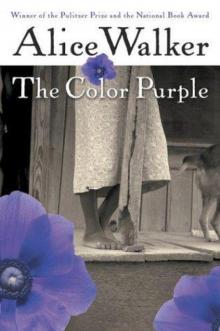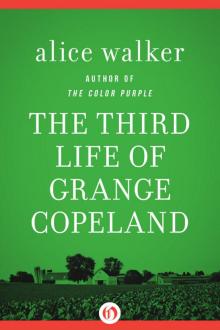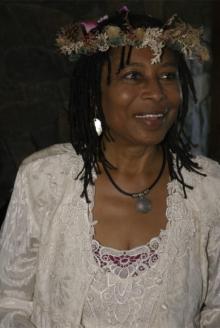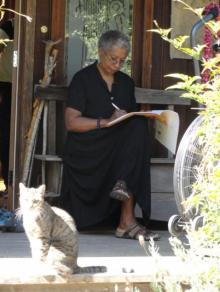- Home
- Alice Walker
The Temple of My Familiar Page 2
The Temple of My Familiar Read online
Page 2
She gave up trying to improve the world and, instead, declined to notice it. As a teenager, Arveyda had felt no strong connection to her. He was good in band, terrible in everything else. She did not seem to mind. Everyone on their block praised him for his music. He sang and played guitar and flute. She gave him no praise. She looked through him. One day the picture of his father--kept in a silver frame on the night table by his bed his whole life--disappeared.
"Nothing, No Thing, Can Replace Love." That is what she'd wanted on her headstone, but one of her sisters, his aunt Frudier, to whom she'd left this directive, thought it too risque. His mother was instead buried under a pale gray stone that carried only her name, and not even the year she was born. But he thought of it as a kind of key to her he might use later on, when he knew more. Who was she, this woman who was his mother? He didn't know.
Lying with Carlotta on his spacious bed, the blue satin duvet cover smooth and cool beneath their legs, Arveyda told her odd bits and pieces of his life. Of the father figure he'd somehow found for his adolescent years, while his mother stared vacantly out the window. Simon Isaac. Or Uncle Isaac. Not that he would ever dare call Mr. Isaac "uncle" to his face, only in his heart; he understood he must never call anyone "uncle" except another black person.
Mr. Isaac was a greengrocer in the neighborhood where Arveyda and his mother lived. Tall and big-boned, with brooding brown eyes and a mane of wiry red hair, he sat in the doorway of his shop playing the violin.
All the children of the neighborhood crowded around, the nickels and dimes clutched in their palms for sweets temporarily forgotten. He mesmerized them with his perfectly lovely, improbable music--none of the children had seen a violin before. No one was more enchanted than Arveyda, whose fingers crept, all on their own, to rest on the box of the fiddle. "Fiddle" was the word for violin Arveyda had once heard at home. He inched ever closer, so that he could feel the sweetness of the vibrations down in the center of himself; the near orgasmic opening out in the base of his groin. It seemed natural, when he at last owned both a cheap guitar and a flute, that he would sit on a Coca-Cola crate near Mr. Isaac's straight chair and play. Natural, also, that Mr. Isaac would encourage his efforts with quick flashes of delight from his suddenly friendly eyes; and that, frequently, as they played together more and more easily, he would seem to forget Arveyda's presence and only at the end of a tune look across at him--brown, skinny, perched on the Coca-Cola crate--and, with a lopsided smile, ruffle his rough curls.
"And what happened?" asked Carlotta, imagining Isaac the Greengrocer playing his violin and never working.
"He had come from Palestine," said Arveyda. "Everyone in his village not dead or too sick to move came here, to America. He used to tell me about what it was like on the boat coming over. How packed it was. How afraid everyone was of getting sick. There had been an epidemic, some kind of plague. And the people were all herded together and actually stank, he said, from fear. And when they got to Ellis Island, on the very day they arrived, he discovered a boil in his left ear--a big fat juicy boil, like a baseball sticking out of his ear, was how he described it. Or like a spider's egg sack, when he was feeling more modest. He was sure he had 'it.' And right away the doctors 'in their white coats'--he always said that--came aboard, and they lanced the boil while looking very nervous about possible contagion. He was not permitted off the ship for two weeks, while 'those in authority' discussed whether he should be sent right back to Palestine. After that, they took him to a quarantine barrack, and there, from day to day, he 'politely rotted,' as he liked to put it. His ear began to heal but the rest of him began to feel 'not so terrific.''
"Ellis Island?" Carlotta queried.
Arveyda explained how it was the same as Angel Island, only on the East Coast.
Angel Island, where mostly Asian immigrants were detained, sometimes for years, before being permitted into the country, was a place that, thanks to the aid of rich American friends, as Zede once mysteriously mentioned, Carlotta and her mother had avoided.
"It was there, on Ellis Island," Arveyda continued, "that Uncle Isaac saw his first native-grown colored man. He was pushing a broom. It wasn't, he said to me once, that he'd never seen brown people; the Arabs in Palestine were brown, but their brownness seemed only skin-deep, whereas this man that he watched pushing the broom, with a little skiphop in his walk as he mumbled lyrics to songs and hummed under his breath, seemed to be colored all the way to, and past, his own bones. It was the first thing he understood about colored people--that it was probably the hopskip way the man pushed the broom, and seemed to be singing in his head, that annoyed white people, not just the color of his skin. In truth, he could not see how anyone could object to that. A more luminous, clean-brown anything was hard to imagine. 'Even if you only liked calfskin gloves,' said Uncle Isaac, 'even if you only admired a nice pair of oxblood-colored loafers! Even if you only loved Hershey bars!' And he would laugh.
"This man, as it turned out," said Arveyda, "was a musician, who worked on Ellis Island as a janitor to support himself and his family.
"Soon everyone else in the barrack had been pronounced free of disease and left, and there were just the two of them. They talked, using their hands, eyes, strange sounds, and hops and skips, about music. The colored man's name was Ulysses, and after Isaac left Ellis Island he never saw or heard of him again. But he always remembered that on his last day in that place, just when he thought he'd go mad from the isolation and boredom, Ulysses brought the news, long before there was any official announcement to him, of his impending release, and brought him also a news magazine full of pictures of the world he was about to enter, in which not a single face that looked like Ulysses' appeared. Uncle Isaac said he searched each photograph carefully, a cold dread settling in his chest; what sort of world was this, in which his very present friend did not appear? And then, from the pocket of his baggy brown coat, with its frayed holes at the elbows, Ulysses had produced and offered to him a bright red apple. This gift was Ulysses' handshake and hug. And it left Mr. Isaac hungry. For, unable to embrace a colored person--Ulysses warned him it was practically illegal to do so--what was he to offer? Nothing was yet his."
Carlotta smoothed the hair that poufed above Arveyda's ear. She kissed him on the eyes. No barrier like that for her, she thought, happily. Ever. Ever. None. None. It made her feel terribly free, and she laid herself full length against his comforting warmth, the sheen of his skin seeming to add a shimmer to her own. She nestled against all this goodness, which felt to her to be the very flesh of the earth. How foolish, how pitiful people were, she thought, not to know enough to try to get next to what could only do them good.
"It was a magic apple," said Arveyda, smiling into her hair. "This was before the time of poisoned, drug-filled apples. Musicians used to carry only healthful things. Really." He laughed. "There was even a time when musicians did not smoke reefer. Although probably never a time when they didn't drink wine."
Carlotta smiled with him.
"There was even a time"--Arveyda looked down mischievously into her face--"and I know you won't believe this, when music was played softly, to be heard. Only dead people need loud music, you know. I call loud rock 'Dracula music' because you look out, and there are all those dead and deaf and soulless zombies clod-hopping across the floor. Even colored people are zombies these days. It's enough to shrivel up your short hairs."
"You were talking about fruit," said Carlotta, giggling.
"So I was," said Arveyda. "So, Uncle Isaac bit into the apple and thought about his future. In Palestine he'd peddled orchard fruit and garden vegetables with his father, a hirsute, pious man. He would try the same thing in America. His basket grew into a cart, his cart into a stand, his stand into a store. He became a success. But he was not happy, even after realizing his youthful ambition to study 'in university' and to learn to play the violin. He missed the heat and the peaches and the Arabs. For Arabs had lived all around him in Palestine, just as colored peo
ple lived all around him in Terre Haute. Many of the dead he'd left behind, his friends, were Arabs.
"When he learned there would be a Jewish state, he accepted it as an excuse to go back. But he was really going back to the sun, the dates, the almonds, the oranges, the grapes, the sound of the Arab language that had filled his head as a boy, though he had spoken it only in the phrases learned on the street. He would go back to help them all build, he said. And he closed up his shop one day and left."
It was of his mother that Arveyda thought the first time he met Zede. That small, sad, Indian-looking woman so proud, Carlotta had told him, to be Spanish.
Zede sat in the middle of a garishly decorated living room of sky-blue sofas with fringes on the bottom and lamps with colonial Spanish ladies endlessly promenading around their bases. She was binding peacock feathers together to make capes, using the broken and partially ruined feathers as inset pieces in shoulder bags. She watched him suspiciously from lowered, tightly controlled, birdlike eyes. He could see he confused her. Brown skin, kinky hair, beautiful body, ready smile. She looked at him sadly, as if remembering him, and he thought she sniffled, as if she had a cold, or was about to weep.
When Arveyda was brought to meet Carlotta's mother, he had not known what to expect. Zede had yellower skin than Carlotta, and her hair was bleached auburn, frizzed up in a style that seemed matronly. It was a surprise to him to see how young she really was. This woman who, in her lifetime, had known both magic and priests, in a country to which, for instance, television and the pickup truck--until very recently, he imagined--were unknown. A woman who had been arrested as a Communist, spent years in prison--at least three, Carlotta had thought--and then somehow made her way to North America. He bowed over her hand and would have kissed it, but Zede shyly drew it back and put it out of sight, in the pocket of her smock.
She was dressed in an outfit of the dullest blackish-green, and from beneath the nest of her frizzy brown hair, fried lifeless, her slanting eyes glittered.
"How do you do?" she asked in the diffident style of night classes at San Francisco State.
"Just fine. How're you?" he answered in the same style. Then, because her smallness and bashfulness moved him, he added, "Not bad atall."
She and Carlotta, in their new prosperity, lived now in a roomy, light-filled flat on Clement Street, surrounded by restaurants. From one of them Zede had gotten their dinner, which she dished out timidly, as Carlotta showed him around the flat.
Alone as he had been while growing up, and as he was now, Arveyda was wounded by the intense isolation of these two. There were schmaltzy pictures of sunsets and trees, happy white children chasing balloons, but none of relatives or of people who resembled Zede and Carlotta at all. In Zede's bedroom, on the night table, there was an old snapshot of her and Carlotta taken just after they arrived in San Francisco. Zede's drawn face, seemingly frightened even of the photographer, was partly in shadow. Carlotta, her face moonlike, a string of beads around her tiny wrist, leaned out of her mother's arms, as if eager to embrace this new land. In both their faces he recognized the stress of oppression, dispossession, flight.
He would know them a very long time, he felt, sitting down to a tasty Vietnamese meal, and smiling from one to the other of them, like a man of serendipitous choice.
"IT IS AS IF you went out," Carlotta's mother sobbed after that first meeting, "and brought your father home. Ai, ai," she cried, striking her head with her palm in a gesture of pain Carlotta had never seen before, but which she was instantly tempted to duplicate. "He was Indio, your father, and his hair was rough."
But now Carlotta and Arveyda had been married for three years. They had two children her mother adored.
"Arveyda loves you," said Zede. "You must believe this. But also, he and I loved each other from the start."
ARVEYDA WAS RICH. HE had more money, Carlotta sometimes thought, than the government of her mother's country. Once, to prove to her she would never again be in want, he took thousands and thousands of dollars from the bank and blew them all over her bedroom with an electric fan. Then they lay on the bills, as if on leaves in a forest, and made love.
Carlotta would have none of his money now. She had studied women's literature in college. That is what she would teach. Taking her children away from Arveyda and Zede was the only way she could make them hurt as she was hurting. She could not know at the time how much she was hurting herself.
Letters from them as they traveled through Mexico and Central and South America she resisted opening for many months, preferring to think of them as dead. But they were her only family, after all.
Actually, only her mother wrote. Short, grieving, heavily scented letters that recalled Zede vividly.
"Mija, mi corazon," they all began. (My daughter, my heart.) And there was the sound of Zede weeping. But as the letters continued to arrive, Carlotta, reading through the evaporated teardrops, which had left puckered circles on the pages, sensed an animation in her mother's spirit she had never felt before.
Arveyda and Zede traveled through countries of incredible natural lushness. Zede had never seen such rivers, such fish ... there was a fish that mated for life, she wrote; when they caught one from the boat and prepared it for dinner, its mate swam furiously around and around the boat and actually followed it for miles ... such trees, fruits, birds, and sky.
Carlotta imagined her mother at the railing of a ship, relaxed against Arveyda's body, the sun finding white glints in her once-again straight black hair.
"The food, every bit is good. Muy delicioso!" she wrote. And Carlotta remembered the crab sauteed in onion and peppers her mother liked and how that had been their once-a-month treat after her mother began selling the feathered things. Now she thought of her eating the food she liked all the time, growing sleek and maybe a little plump, the wrinkles around her eyes and on her forehead filling out. Her skin losing its sallowness and becoming tan and vibrant. She realized she had never known Zede at peace. Always, she had been anxious, worried, frantic over the requirements of life for the two of them.
They'd slept together only once, Arveyda and Zede, before Carlotta was told.
Arveyda had brought the children for Zede to keep for the weekend, as she often did. Their brown, warm little bodies did magical things to her. She held them, squirming and wriggling or drowsy and contented, in her arms, and her cares seemed far away. That day they had been playing on Zede's big bed, the children in the middle, she and Arveyda on the edges. It was a gray, rainy day, and her bedroom was all pink. Soft music was playing, by a man, Sidney Bechet, she liked. The children drifted off to sleep. As Arveyda lifted their limp bodies to take them into the other room, nearly asleep himself, she'd felt, as she did so often and as often tried to hide, a deep longing for him. But he is so young, she thought. El padre de mis nietos. El esposo de mi ninita. My son-in-law. Here she giggled, because she always confused the word "son" with "sun."
Arveyda looked at her, the sleeping baby in his arms, one plump arm flung wide in peace. Longing was like a note of music to him, easily read. He knew.
When he came back, he sat on the floor beside the bed. His voice shook. "We can't do anything about it, right?"
"No," she said, her voice also trembling. She tried to laugh. "I am grandmother. That's it." She meant, "That's all."
"I love you though," he said. "Not like a grandmother ... maybe a little like a mother." He apologized with his smile, which was in his voice. His face was still turned away from her. "No," he said, "like a woman. Zede. I love Carlotta; don't worry. I also love you."
How long had it been building between them, she wondered. Since the first day, since meeting. She'd smelled the scent in his hair as he bent toward her hand. The spiciness of it, the odor of her village flowers. She'd taken back her hand and hidden it, flaming, from him. After all, he was Carlotta's. Carlotta had found him.
"Nothing we can do, yes," she said, firmly. But with a glowing point of light, hot, growing in her heart,
and between her legs she was suddenly wet.
Her hand trembled as she touched his hair, and the scent of him--the scent of safely sleeping, well-fed babies--reached her nose. His hair. There were flecks of gray. Glints of red and brown.
Kinky, firm, softly rough. Exactly the feel of raw silk. The only hair like this--pelo negro--in the world. Running her fingers through it, tugging. Trying for the light, resigned touch. Trying to be la madre. Trying to be friends. Her womb contracted so sharply she nearly cried out.
She prayed Arveyda wouldn't turn and look at her. He did. His eyes inches away. His white teeth, his mustache and beard. His brown eyes that seemed so pained. His sweet breath. Like coconut. She smiled to think this about the coconut; she was such a campesina! He leaned forward to kiss the smile. She drew back.
"And you, Zede?" he asked. "Am I just the son-in-law? I know we can never do anything ... but I want to know."
"Ah, me," she said, attempting a little laugh that denied the hot heart and the light in her womb, the wetness nearly on her thighs. The laugh, so false, so incapable of all the deceit required of it, turned into tears. Arveyda took her face in his hands. It had become younger since he'd known her. The birdlike eyes didn't dart about so, the twitch was gone. Only the sadness of the dispossessed of love remained. He would kiss it away.
Zede had made love only twice before in her life. Until she met Arveyda she hadn't thought about sex; she was too busy and her memories were too painful. Though she had had sex, it had been brief. Sometimes her daughter was the only proof that a man had made love to her. Now it was as if she had a new body. Arveyda was kissing all of it, the way she would have wanted someone she loved to kiss it when she was embarazada. Under his lips she felt the flowering of her shriveled womb and under his tongue her folded sex came alive. The hairs on her body stood like trees. In truth, the light that she felt inside her in womb and heart now seemed to cover all of her; she felt herself dissolve into the light.

 In Search of Our Mothers' Gardens: Prose
In Search of Our Mothers' Gardens: Prose In Love and Trouble: Stories of Black Women: Stories of Black Women
In Love and Trouble: Stories of Black Women: Stories of Black Women Anything We Love Can Be Saved
Anything We Love Can Be Saved The Color Purple
The Color Purple By the Light of My Father's Smile
By the Light of My Father's Smile The Third Life of Grange Copeland
The Third Life of Grange Copeland You Can't Keep a Good Woman Down
You Can't Keep a Good Woman Down The Temple of My Familiar
The Temple of My Familiar Possessing the Secret of Joy
Possessing the Secret of Joy We Are the Ones We Have Been Waiting For
We Are the Ones We Have Been Waiting For The Way Forward Is With a Broken Heart
The Way Forward Is With a Broken Heart Meridian
Meridian Revolutionary Petunias
Revolutionary Petunias A Poem Traveled Down My Arm
A Poem Traveled Down My Arm Once
Once Horses Make a Landscape Look More Beautiful
Horses Make a Landscape Look More Beautiful Living by the Word
Living by the Word In Love and Trouble
In Love and Trouble The Color Purple Collection
The Color Purple Collection Now Is the Time to Open Your Heart
Now Is the Time to Open Your Heart Color Purple Collection
Color Purple Collection Taking the Arrow Out of the Heart
Taking the Arrow Out of the Heart The World Will Follow Joy
The World Will Follow Joy Meridian (1976)
Meridian (1976) Absolute Trust in the Goodness of the Earth
Absolute Trust in the Goodness of the Earth In Search of Our Mothers' Gardens
In Search of Our Mothers' Gardens